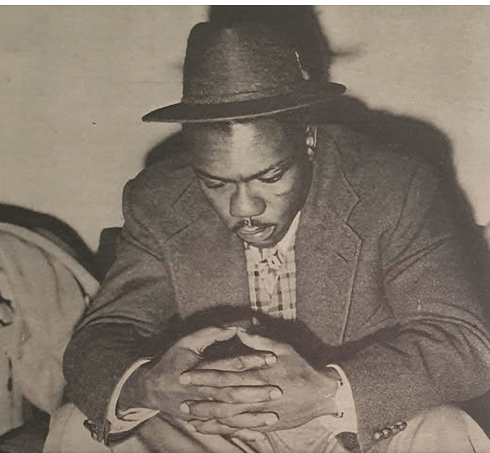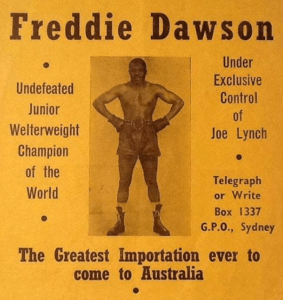Featured Articles
History has Shortchanged Freddie Dawson, One of the Best Boxers of his Era

History has Shortchanged Freddie Dawson, One of the Best Boxers of his Era
This reporter was rummaging around the internet last week when he stumbled on a story in the May 1950 issue of Ebony under the byline of Mike Jacobs. Boxing was then in the doldrums (isn’t it always?) and Jacobs, the most powerful promoter in boxing during the era of Joe Louis, was lassoed by the editors of the magazine to address the question of whether the over-representation of black boxers was killing the sport at the box office.
This hoary premise had been kicking around even before the heyday of Jack Johnson, bubbling forth whenever an important black-on-black fight played to a sea of empty seats as had happened the previous year when Chicago’s Comiskey Park hosted the world heavyweight title fight between Ezzard Charles and Jersey Joe Walcott.
Jacobs ridiculed the hypothesis – as one could have expected considering the publication in which the story ran – and singled out three “colored” boxers as the best of the current crop of active pugilists: Sugar Ray Robinson, Ike Williams, and Freddie Dawson.
Sugar Ray Robinson? A no-brainer. Skill-wise the greatest of the great. Even those that didn’t follow boxing, would have recognized his name. Ike Williams? Nowhere near as well-known as Robinson, but he was then the reigning lightweight champion, a man destined to go into the International Boxing Hall of Fame with the inaugural class of 1990.
And Freddie Dawson? If the name doesn’t ring a bell, dear reader, you are not alone. I confess that I too drew a blank. And that triggered a search to learn more about him.
Freddie Dawson had four fights with Ike Williams. All four were staged on Ike’s turf in Philadelphia. Were this not the case, the history books would likely show the series knotted 2-2. Late in his career, Dawson became greatly admired in Australia. But we are jumping ahead of ourselves.
Dawson was born in 1924 in Thomasville, Arkansas, an unincorporated town in the Arkansas Delta. Likely a descendent of slaves who worked in the cotton plantations, he grew up in the so-called Bronzeville neighborhood of Chicago, the heart of Chicago’s Black Belt.
The first mention of him in the newspapers came in 1941 when he won Chicago’s Catholic Youth Organization (CYO) featherweight title. In those days, amateur boxing was big in the Windy City, the birthplace of the Golden Gloves. The Catholic Archdiocese, which ran gyms in every parish, and the Chicago Parks Department, were the major incubators.
In his amateur days, he was known as simply Fred Dawson. As a pro, his name often appeared as Freddy Dawson, although Freddie gradually became the more common spelling.
Dawson, who stood five-foot-six and was often described as stocky, made his pro debut on Feb. 1, 1943, at Marigold Gardens. Before the year was out, he had 16 fights under his belt, all in Chicago and all but two at Marigold. (Currently the site of an interdenominational Christian church, Marigold Gardens, on the city’s north side, was Chicago’s most active boxing and wrestling arena from the mid-1930s through the early-1950s. Joe Louis had three of his early fights there and Tony Zale was a fixture there as he climbed the ladder to the world middleweight title.)
The last of these 16 fights was fatal for Dawson’s opponent who collapsed heading back to his corner after the fight was stopped in the 10th round and died that night at a local hospital from the effects of a brain injury.
Dawson left town after this incident and spent most of the next year in New Orleans where energetic promoter Louis Messina ran twice-weekly shows (Mondays for whites and Fridays for blacks) at the Coliseum, a major stop on boxing’s so-called Chitlin’ Circuit.
That same year, on Sept. 19, 1944, Dawson had his first encounter with Ike Williams. He was winning the fight when Ike knocked him out with a body punch in the fourth round.
The first and last meetings between Dawson and Ike Williams were spaced five years apart. In the interim, Freddie scored his two best wins, stopping Vic Patrick in the twelfth round at Sydney, NSW, and Bernard Docusen in the sixth round in Chicago.

The long-reigning lightweight champion of Australia, Patrick (49-3, 43 KOs) gave the crowd a thrill when he knocked Dawson down for a count of “six” in the penultimate 11th round, but Dawson returned the favor twice in the final stanza, ending the contest with a punch so harsh that the poor Aussie needed five minutes before he was fit to leave the ring and would spend the night in the hospital as a precaution.
Dawson fought Bernard Docusen before 10,000-plus at Chicago Stadium on Feb. 4, 1949. An 8/5 favorite, Docusen lacked a hard punch, but the New Orleans cutie had suffered only three losses in 66 fights, had never been stopped, and had extended Sugar Ray Robinson the 15-round distance the previous year.
Dawson dismantled him. Docusen managed to get back on his feet after Dawson knocked him down in the sixth, but he was in no condition to continue and the referee waived the fight off. Dawson was then vacillating between the lightweight and welterweight divisions and reporters wondered whether it would be Robinson or Ike Williams when Dawson finally got his well-earned title shot.
Sugar Ray wasn’t in his future. Here are the results of his other matches with Ike Williams:
Dawson-Williams II (Jan. 28, 1946) – The consensus on press row was 7-2-1 or 7-3 for Dawson, but the match was ruled a draw. “[The judges and referee] evidently saw [Williams] land punches that nobody else did,” said the ringside reporter for the Philadelphia Inquirer.
Dawson-Williams III (Jan. 26, 1948) – Dawson lost a majority decision. The scores were 6-4, 5-4-1, and 4-4-2. The decision was booed. Ike Williams then held the lightweight title, but this was a non-title fight. (It was tough for an outsider to get a fair shake in Philadelphia, home to Ike Williams’ co-manager Frank “Blinky” Palermo who would go to prison for his duplicitous dealings as a fight facilitator.)
Dawson-Williams IV (Dec. 5, 1949) – This would be Freddie Dawson’s only crack at a world title and he came up short. Ike Williams retained the belt, winning a unanimous decision. The fight was close – 8-7, 8-7, 9-6 – but there was no controversy.
Dawson made three more trips to Australia before his career was finished. On the first of these trips, he knocked out Jack Hassen, successor to Vic Patrick as the lightweight champion of Australia. A 1953 article in the Sydney Sunday Herald bore witness to the esteem in which Dawson was held by boxing fans in Australia: “None of our boxers could withstand his devastating attacks which not only knocked them out but also knocked years off their careers,” said the author. “It is doubtful whether any Australian boxer in any division could have beaten Dawson.”
Dawson had his final fights in the Land Down Under, finishing his career with a record of 103-14-4 while answering the bell for 962 rounds. Following what became his final fight, he had an eye operation in Sydney that was reportedly so intricate that it required a two-week hospital stay. He injured the eye again in Manila while sparring in preparation for a match with the welterweight champion of the Philippines, a match that had to be aborted because of the injury. Dawson then disappeared, by which we mean that he disappeared from the pages of the newspaper archives that allow us to construct these kinds of stories.
What about Freddie Dawson the man? A 1944 story about him said he was an outstanding all-around athlete, “a champion in all athletic undertakings – basketball, baseball, track and even jitterbugging.” A story in a Sydney paper as he was preparing to meet Vic Patrick informs us that he had two young children, ages 2 and 1, owned his own home in Chicago, and drove a two-year-old Cadillac. But beyond these flimsy snippets, Dawson the man remains elusive.
What we learned, however, is that he was one of the most underrated boxers to come down the pike in any era, a borderline Hall of Famer who ought not have fallen through the cracks. Inside the ring, this guy was one tough hombre.
To comment on this story in the Fight Forum CLICK HERE
-

 Featured Articles3 weeks ago
Featured Articles3 weeks agoVito Mielnicki Jr Whitewashes Kamil Gardzielik Before the Home Folks in Newark
-

 Featured Articles3 days ago
Featured Articles3 days agoResults and Recaps from New York Where Taylor Edged Serrano Once Again
-

 Featured Articles1 week ago
Featured Articles1 week agoFrom a Sympathetic Figure to a Pariah: The Travails of Julio Cesar Chavez Jr
-

 Featured Articles4 weeks ago
Featured Articles4 weeks agoCatching Up with Clay Moyle Who Talks About His Massive Collection of Boxing Books
-

 Featured Articles2 days ago
Featured Articles2 days agoResults and Recaps from NYC where Hamzah Sheeraz was Spectacular
-

 Featured Articles1 week ago
Featured Articles1 week agoCatterall vs Eubank Ends Prematurely; Catterall Wins a Technical Decision
-

 Featured Articles3 weeks ago
Featured Articles3 weeks agoMore Medals for Hawaii’s Patricio Family at the USA Boxing Summer Festival
-

 Featured Articles3 days ago
Featured Articles3 days agoPhiladelphia Welterweight Gil Turner, a Phenom, Now Rests in an Unmarked Grave


















